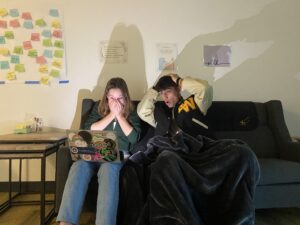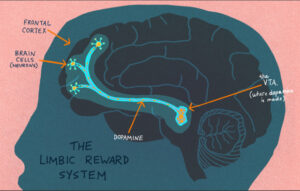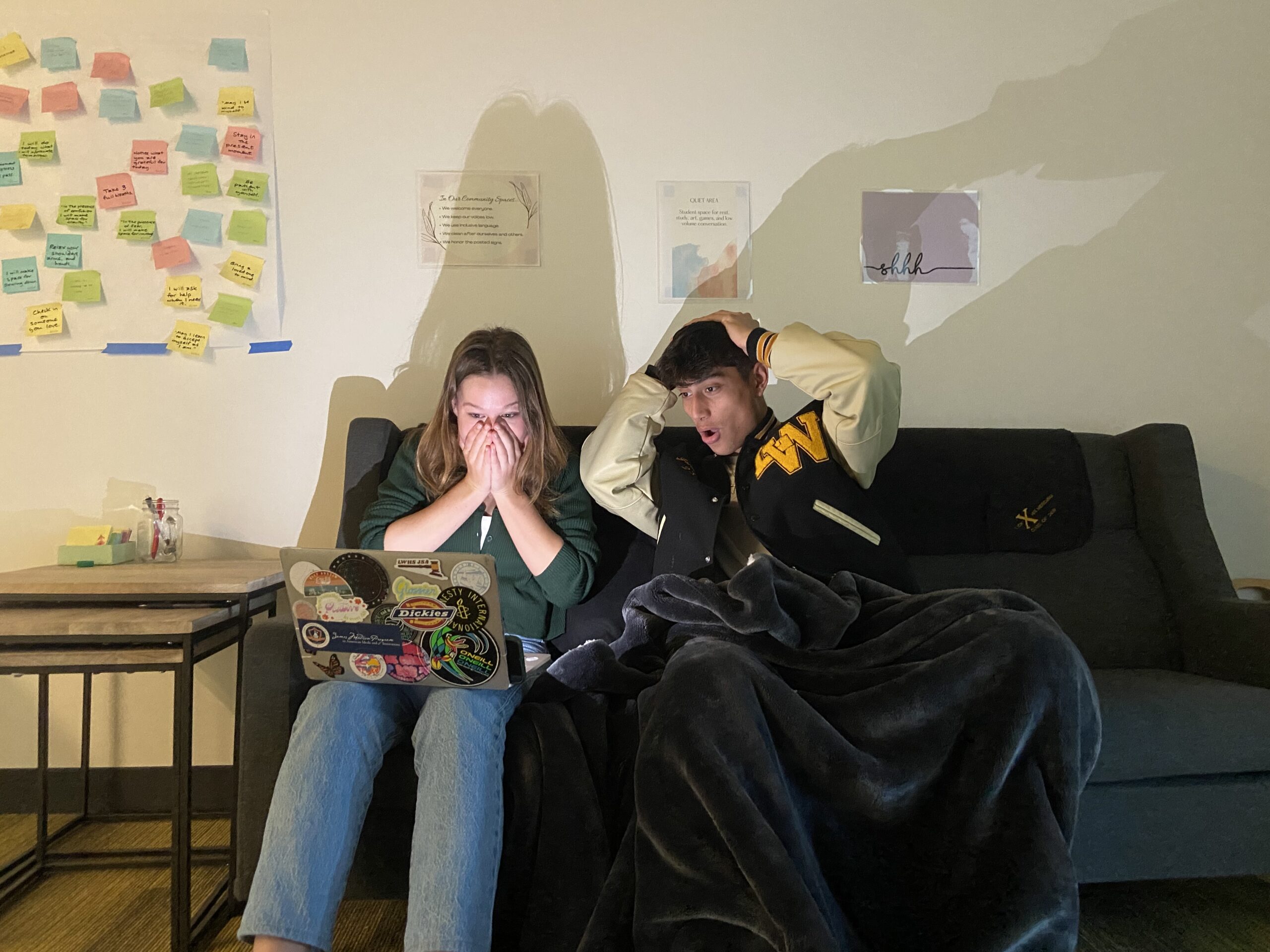Despite all of our natural self-preservation instincts, humans find pleasure in fear. We watch scary movies in the dark on Halloween and wait for hours in line to get on a rickety, old, dangerous roller coaster. So why do we subject ourselves to the inevitable nightmares and anxiety that follow by knowingly exposing ourselves to the most scary stories? There are a few explanations for this question of why humans enjoy fear, including everything from simply enjoying the thrill to having a desire to practice confronting our fears.

Photo by Odin Marin
According to the Washington Post article, “Why we like scary things: The science of recreational fear,” researchers recognize different categories of people who consider themselves to be horror fans, ranging from those who live for the adrenaline rush to others who use horror to manage their anxiety. The article also describes recreational fear as the “paradox of horror.” Even though fear plays an important role in our lives to enforce basic survival instincts, 55% of surveyed Americans describe themselves as horror movie fans.
“There’s something really pleasurable about conjuring up an emotion that would usually come in a scary situation and getting goosebumps,” LWHS Brain and Behavior teacher Anton Krukowski said. He noted that good music can give a listener goose bumps, also a favorable experience.
“I really connect the idea of watching a horror movie with the idea of going on a roller coaster because I used to be terrified of going on one, just like I used to hate horror movies. But then I started doing both, and now I see them in the same way in my head. It’s like putting yourself in a pseudo-dangerous situation,” Z Davis Krukowski ’23 said. The pleasure associated with fear is in fact very similar to the thrill that comes with riding a roller coaster. The sensation may last longer than the duration of the movie or rollercoaster ride as a result of the lasting dopamine release.
The Psychology Today article “Predictable Fear” describes the inherent differences between knowing a scare is coming and being surprised by fear. Anticipated fear activates the nucleus accumbens and rewards the limbic system, the emotional circuit of the brain, creating a positive sensation of simultaneous fear and excitement. Additionally, if an individual feels genuine fear in a situation that ends up resolving itself, we can convince ourselves that the feeling was excitement the entire time.

Photo courtesy of WikiMedia Commons
There are also distinct differences between fear, anxiety, and phobia. Fear is a short term emotion that goes along with surprise, while phobia describes long-term anxiety within a certain realm of life. Anxiety develops as a result of less predictable threats. For example, avoiding spiders for a long period of time after watching a documentary is different from experiencing momentary fear while watching a murderer chase innocent children down the street.
However, some symptoms are shared between fear and phobia. “While there’s a big difference between acute stress and chronic stress, there is also some overlap: being in a constant state of fear and anxiety is actually just hammering away at the stress response system as if you’re constantly giving someone a shock,” Krukowski said.
The hypothalamus is home to the stress response in the brain. Common symptoms of stress include increased frequency of breathing and heart rate, dilation of pupils and sweaty palms.
The recognition of fear triggers an additional response in the amygdala, which alerts the nervous system and releases cortisol and adrenaline (stress hormones). Blood flow is redirected towards the limbs, a process that is better known as the fight or flight response. According to Krukowski, this expression actually has a third facet: “Fight or flight should really be called fight, flight or freeze. That’s another option,” he said.
While experiencing fear, the cerebral cortex — the outermost layer of the brain — shuts down, impairing one’s reasoning and judgment skills. This makes it difficult to make rational decisions while experiencing stress as a result of fear.
Fear has an important role in our lives: it forces us to avoid situations that we perceive as dangerous. Nightmares have a similar function; they are a way for our brains to practice surviving scary situations. “Nightmares are so versatile. One theory explaining nightmares is that they allow you to practice how you would respond in stressful situations, totally unconsciously. You get to try out different responses in the dream while knowing you are safe the whole time,” Krukowski said.
Davis Krukowski, a horror fan, elaborated on how horror movies can give you a healthy scare. “At least for me, movies have always been a really good way of exploring emotions… and I think fear is a very important one to explore in this way because when fear organically comes up, it’s normally a bad situation, but embracing it and enjoying it and feeling that sense of thrill is, I think, really healthy and really important,” she said. “Horror media, whether it be books or movies or games, are all very controlled ways that you can do it because you can always turn it off or step away if it gets to be too much.”
Hailey Moy ’25 is not a fan of horror. She described how the most scary movies for her are the ones that are lifelike and somewhat rational. “Realistic horror movies are scarier because it’s easier to imagine those things happening to me,” Moy said.
“I mainly enjoy horror movies when I’m with friends. They are more fun to watch with others because you’re getting scared together,” Kailee Mahlstedt-Kamekona ’23 said.
Emmie Hou ’24 only enjoys horror movies in certain settings. “I prefer watching horror movies at home instead of in theaters because it’s not as immersive of an experience. And, you can talk with your friends throughout and have a running commentary on the side instead of just being terrified alone,” she said.
LWHS Body Mind Education Teacher Daniel Tesfai expressed that his opinions on horror have shifted over the years as the genre has undergone dramatic changes. “I grew up in an era where horror movies were really big. You would watch movies like Halloween, Friday the 13th, Scream, you know. I just feel like the new horror movies have no real story line — there’s nothing gripping, it’s just ‘how can we scare you?’” he said.
The question of “how can we scare you?” is a prominent one. There are several different types of scares, with a few examples being jumpscares, a thrilling plot and gore. There are a variety of horror subgenres, including gothic horror, supernatural horror, monster movies, psychological horror, splatter films, slasher films, body horror, comedy horror and postmodern horror.
Silas Shaw ’25 prefers the scary plots. “In horror movies with a lot of jumpscares, I wait the whole time to get scared. I feel like it’s harder to appreciate the movie. A really good movie doesn’t need a lot of jumpscares to make you frightened, they use your imagination to scare you,” he said.
Jumpscares have an edge on other methods of igniting fear in an audience because they incorporate the element of surprise. The popularity of the game Peek-A-Boo shows that humans enjoy a good jumpscare even at a young age.
Despite the fact that the idea of fear generally has a negative connotation, it keeps some people coming back for more. So what part of watching others experience our own worst nightmares is enjoyable to the human brain?
Katrina Pehling ’23 enjoys horror more for the plot and common themes. “I’m kind of a scaredy-cat for being a horror movie enjoyer. However, as a queer person, themes of monstrosity appeal to me,” Pehling said. They simply endure the scary parts of horror movies because the topics that some address are meaningful to them.
Horror tackles difficult topics, including breaking down who we choose to vilify as a society and what it feels like to be alone. “I really like horror. I think it’s a great outlet for people who feel kind of outcast, even though that might be cliché,” Davis Krukowski said.
Maybe a healthy dose of predictable fear is good for humans. Or, maybe we forget the devastation and fear once we turn off the TV, still alive and well, and look back remembering only excitement. Regardless, the paradox of horror is a complex one, and the science confirms that any kind of reaction to a good scare is a human one.






